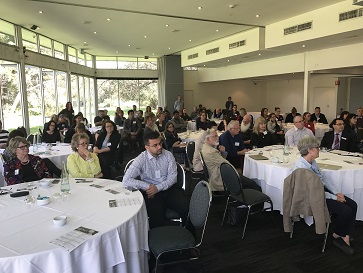
The NHMRC Centre for Research Excellence on Health Equity (CREHE) held a symposium entitled De-Industrialisation: Employment, Health and Equity Impacts for People and Communities on 21st September to explore the links between changing employment conditions and health equity for communities, drawing on local and global experiences. The symposium brought together over 100 employment, labour market, health equity experts and community and policy stakeholders to share their expertise and explore the anticipated social and health effects of changing employment conditions in South Australia. In particular the symposium focused on the projected social and health impacts of the imminent October closure of General Motors Holden (GMH) automotive manufacturing on the Playford community where it has been based.
Professor John Spoehr, a chief Investigator on the CREHE and director of the Australian Industrial Transformation Institute, provided an overview of the employment impact of the GMH closure, while our international expert Professor’ Ron Labonté (University of Ottawa) shared a global perspective highlighting rising global income inequalities. Our other international speaker, Professor Jennie Popay (University of Lancaster) talked about the UK Communities in Control study, an evaluation of a place based community empowerment initiative on local action on health inequalities and emphasised the importance of community practical wisdom. Closer to home Dr Siobhan Harpur (Public Health Services, Tasmania) provided some insights into the challenges of policy implementation in Tasmania. Professor Sharon Friel (CREHE co director, Australian National University) provided an overview of the complexity in policy formulation when responding to the economic shock of the GMH closure and introduced the CREHE study examining these policy formulations in Playford.
Panel discussions throughout the day explored the changing nature of employment conditions and their impact on health and equity for communities, sharing the challenges faced by service providers when trying to mediate the effects on health. The community groups most likely to be affected by the changes and how well the policy response coheres to address community needs were also discussed. Concerns about having meaningful training linked to real job outcomes were highlighted, together with pathways to employment for youth.
The symposium included a recorded ABC Radio National ‘Big Ideas’ panel discussion hosted by Paul Barclay exploring what deindustrialised communities similar to South Australia will look like in 20 years’ time, which included Prof Fran Baum (CREHE Co Director, Southgate Institute); Dr Chelsea Bond (University of Queensland); Prof Jennie Popay (University of Lancaster, UK); Mr Ross Womersley (Chief Executive Officer, SACOSS) and Prof John Spoehr (Flinders University). Check ABC Radio National http://www.abc.net.au/radionational/programs/bigideas/ for program details.

